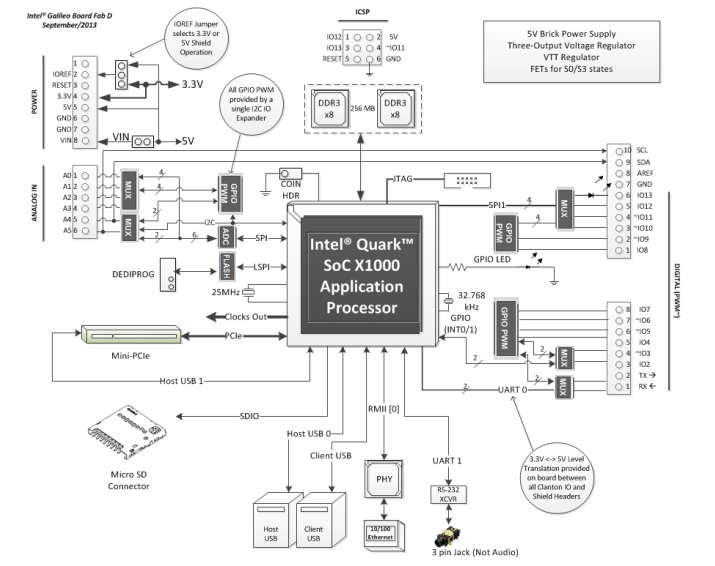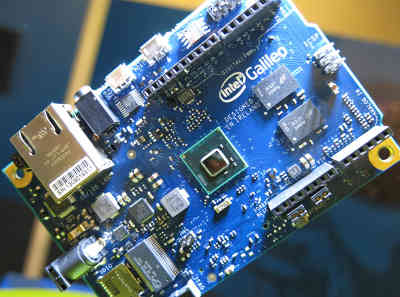| Intel Inside - The Arduino Galileo |
| Written by Harry Fairhead | |||
| Thursday, 03 October 2013 | |||
|
Arduino has just announced two new processor boards - the Intel based Galileo and the Arduino TRE powered by Texas Instruments Sitara AM335x. Of the two it is the Intel-based design that is going to open new doors. The Galileo is an Intel product, apparently the first of many that has been certified by Arduino. What does certified mean? According to Intel's FAQs it means that the board looks like an Arduino Uno R3 but some shields that work with the Uno might not work because of driver problems. The board is also software compatible with the usual Arduino software development system and you should be able to get your programs running on it with no changes.
The heart of the unit is a Quark SoC X1000. i.e. a single chip Pentium class system. In addition to a standard Arduino shield connect it also has the same I/O ports plus a full sized mini-PCI Express slot, 100Mb Ethernet port, Micro SD slot, RS232 serial port, USB host and client ports and 8MByte flash RAM. It also has a real time clock and a jumper that you can use to add a battery backup for it.
It runs at 400MHz and, being a full 32-bit Pentium, it has plenty of power. A Linux kernel is used to get everything up and running and this provides all of the necessary drivers. You can get an overview of the hardware in the following video:
You can't help but ask if a native code development system could be on its way and could you boot it into Windows XP, DOS or full Linux? This is probably a development system that can be pushed beyond just being an Arduino. Update from the Intel FAQ: "Galileo runs Linux* out of the box. It comes in two flavors; the default is a small Linux. If you add an SD card to your kit, you can add a more fully-featured Linux. Refer to the Galileo Getting Started Guide and Quark SoC X1000 IoT Development Kit Software GSG. It seems that if you want to you can simply ignore the Arduino software and work with Linux or you can use both at the same time. Intel is clearly serious about getting a foot in the DIY controller market currently dominated by ARM. The design is open source and you can download the details of the board and build one of your own. Intel also plans to give away 50,000 Galileo boards to 1000 universities worldwide. The board should be available for sale in November - no word on price as yet. If you can't wait till November here is an unboxing video from Intel:
The second new board to be announced, the Arduino TRE, is a collaboration with Texas Instruments. Its key feature is the use of a 1GHz processor, which is claimed to deliver performance that is around 100 times faster than the Leonardo or Uno. It is also a dual machine - the Sitara Linux system plus a standard AVR Arduino. The TRE is expected to ship in Spring next year 2014 and there will be more information on the design in the near future.
More InformationRelated ArticlesArduinoDroid - An Arduino IDE for Android
To be informed about new articles on I Programmer, install the I Programmer Toolbar, subscribe to the RSS feed, follow us on, Twitter, Facebook, Google+ or Linkedin, or sign up for our weekly newsletter.
Comments
or email your comment to: comments@i-programmer.info
|
|||
| Last Updated ( Friday, 04 October 2013 ) |




